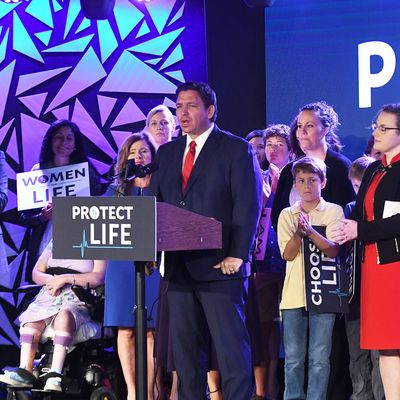
It used to be abortion politics were pretty easy to navigate for Republicans. Nearly all favored a reversal of Roe v. Wade and demagogued about rare (and usually medically necessary) late-term abortions. Many walked on the wild side and favored fetal “personhood” laws and other total bans that affected not only abortion but contraception; outside the ever-attentive ranks of anti-abortion activists, nobody much cared what these pols advocated. After all, Roe protected pre-viability abortions from sea to shining sea as a matter of federal constitutional law.
When the U.S. Supreme Court overturned Roe in June of last year, it was a huge victory for the anti-abortion movement and, in theory, for its GOP allies. But it has created new and difficult choices for Republican politicians.
Arguably no one has handled those choices more clumsily than Ron DeSantis. When SCOTUS was deliberating over what would became the fatal opinion in Dobbs v. Jackson Women’s Health Organization, based on a challenge from Mississippi, the Republican-controlled legislature in Florida enacted, and DeSantis signed, a copycat law, banning abortion after 15 weeks of pregnancy. Nobody knew for sure at that point exactly what SCOTUS would do; the leak of Justice Samuel Alito’s majority opinion was a few weeks away. But DeSantis associated himself with a cruel (and unpopular) approach with no exceptions for pregnancies caused by rape or incest.
Post-Dobbs, as DeSantis prepared to run for president, the Florida law, obnoxious as it was, became conspicuously modest as compared to the total and near-total bans being enacted by Republicans in other southern states. But at the same time, the backlash to the abolition of abortion rights grew intense almost everywhere, playing a big role in the underwhelming GOP performance in the 2022 midterms. So DeSantis characteristically played it both ways: He welcomed a six-week ban, but he signed it in the dead of night, and for a good while (even at the Christian right bastion of Liberty University) wouldn’t talk about it.
That changed when the DeSantis presidential campaign became focused on Iowa and its extremely powerful conservative Evangelical–anti-abortion constituency, whose leaders were offended by Donald Trump’s public remarks describing abortion as a loser of an issue, even as he refused to back any particular post-Dobbs abortion laws. Meanwhile, influential Iowa governor Kim Reynolds signed her own six-week ban (which is currently held up in the courts), and it began to look like DeSantis had gotten it right, at least for the GOP primaries.
But no, as Politico reported this week:
The nation’s leading anti-abortion group on Monday called Gov. Ron DeSantis’ failure to support federal abortion restrictions “unacceptable” — a blow for the Florida Republican, who has passed one of the most restrictive abortion laws in the country.
Susan B. Anthony Pro-Life America was responding to DeSantis’ recent interview with conservative commentator Megyn Kelly, in which the governor said abortion policy would be best decided by the states.
Like several other Republican presidential candidates (notably Trump and Nikki Haley), DeSantis had for months bobbed and weaved and avoided taking a firm position on the prospect of a federal abortion ban that would override state laws, even though the more strident anti-abortion groups like SBA had made a 15-week national ban a litmus test for those seeking their support. But Kelly pinned him down, and DeSantis decided alarming blue-state Americans by threatening state-protected abortion rights wouldn’t be terribly prudent, all the more because the Senate filibuster makes a federal abortion ban inconceivable in the immediate future, as he pointed out.
The SBA group’s president Marjorie Dannenfelser wasn’t having any of it, Politico noted:
“Gov. DeSantis’s dismissal of this task is unacceptable to pro-life voters,” Dannenfelser said. “A consensus is already formed. Intensity for it is palpable and measurable. There are many pressing legislative issues for which Congress does not have the votes at the moment, but that is not a reason for a strong leader to back away from the fight.”
Mike Pence and Tim Scott have signed onto the national ban, leaving DeSantis in a conspicuous spotlight as the advocate of an extremist position on abortion who’s under attack for not wanting to impose his extremist position on all 50 states, at least right away. He’s probably lost any advantage over Trump (already beloved of the anti-abortion movement because he kept his promise to get Roe reversed) on the abortion policy that he might have held or imagined. But the candidate who keeps pledging to make America a jumbo-size replica of Florida cannot run away from the fact that his own state’s citizens are being denied reproductive rights altogether.






























